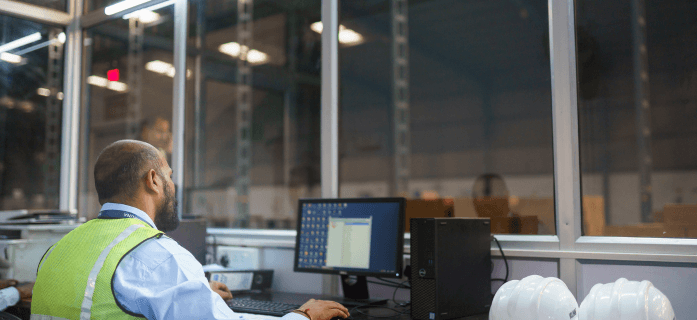WAREHOUSING
Developments in The Warehousing Sectors
4 Oct 2022, 4 MINUTE READ
Over the past few years, two significant themes have emerged in the warehousing industry in India. The first one is the evolution of management, wherein warehousing has progressed from simply being a place to keep merchandise to becoming a critical facilitator of increased capacity utilisation and a significant contributor to storage development and prosperity. The second shift is the growing need for large warehouses due to the rising demand for bigger storage spaces with maximum capacity. Several other developments have occurred in this sector, which will very well define and shape the future of warehousing in India.
Here are some of the developments & trends that are being actively implemented:
Automation Usage

Warehousing is often brushed aside despite being one of the fundamental factors that keep the market afloat. It is important to realise that more than ever before, a robust warehousing strategy is critical for organizations today. For faultless operations, warehousing companies have started automating all operational procedures so that every person is committed to the more critical and challenging jobs. They have implemented autonomous order placing and packing to reduce cost and effort. Additionally, warehousing services have also been further enhanced to provide seamless end-to-end delivery.
Technology Integration
While most firms in the warehouse market in India have prioritised technology in their business plans, others have mainly relied on manual operations for the longest time. However, there is now a surge in technology usage, accelerated by the pandemic outbreak. While businesses raced to reorient their goals and change their working prototypes in 2020, various technology improvements were adopted in 2021 to ensure the seamless execution of warehousing operations and related functions. Today, almost every step in the industry is now mechanised, from ordering to inventory management to packing, and transporting. As technologies continue to evolve, this shift will only become bigger and better in the future.
Pre-preparation
Consumption patterns are changing all the time, and therefore, the ongoing demand patterns call for a more targeted warehousing service experience - one that genuinely looks after needs and requirements and provides convenience from beginning to end of the processes involved. To meet this increased demand, warehousing companies in India are employing technologies like Artificial intelligence, the Internet of Things, and Big Data Analytics to gain information about consumer preferences so that they can adapt to their evolving expectations.
Incorporating Blockchain
Blockchain has the potential to affect warehousing in several ways that can help reap multiple positive benefits. Bigger companies with effective warehousing will be capable of integrating blockchain technologies and methods more effectively, fostering openness, flexibility, improved immediate access, and cheaper processing fees.
Cloud Computing
From job productivity to networking to IoT devices, so many firms in the contemporary age rely in some manner on cloud technology and services, and warehousing is going through a similar transition. Warehouses in many instances were self-contained environments, but now, they need to remain connected to just about every other level of the supply chain due to the growth in networking on a global scale and the requirement to monitor goods from the point of origin to their destination. Using cloud computing helps with automatic updates which keeps everyone in the loop.
We all have been witnessing many interesting shifts when it comes to warehousing trends in India. The astonishing rise of India's economy has fueled a spike in interest for warehousing service providers. Today, we are on the threshold of a fascinating, fast-paced, and revolutionary future, and it is safe to say that the warehousing companies in India will continue to evolve and grow as technological advancements continue.
Frequently Asked Questions
Q1: What are the latest developments in the warehousing sector?+
Ans. Some of the key developments include:
- Automation of order fulfillment and inventory management
- Integration of AI, IoT, and analytics for predictive planning
- Use of blockchain for transparency and faster operations
- Migration to cloud platforms for scalability and control
- Demand for more intelligent & flexible warehouse spaces
Q2: How is technology shaping modern warehousing?+
Ans. Technology is playing a transformative role in modern warehousing. Automation is streamlining operations like order placement and packing, freeing up human resources for more critical tasks. Advanced technologies such as Artificial Intelligence, the Internet of Things (IoT), and Big Data Analytics are helping companies better understand and respond to changing consumer demands.
Related Insights
WAREHOUSING
Towards a Sustainable Future: Reducing Warehouse Carbon Footprint
23 Dec 2021, 6 MINUTE READ
WAREHOUSING
Emerging Warehousing Trends in Tier 2 & 3 Cities: Enhancing Reach
9 Jul 2025, 6 MINUTE READ
WAREHOUSING
Warehouse as a Marketplace: How Warehousing Services are Evolving Beyond Storage?
9 Dec 2024, 5 MINUTE READ
WAREHOUSING
Ethical Logistics: Building Trust through Integrity and Transparency
15 Jul 2024, 6 MINUTE READ
WAREHOUSING
5 Important Benefits of Implementing Lean Warehousing in the Supply Chain Industry
19 Jun 2024, 6 MINUTE READ
Drive efficiencies throughout your supply chain with our technology-enabled services
View Services